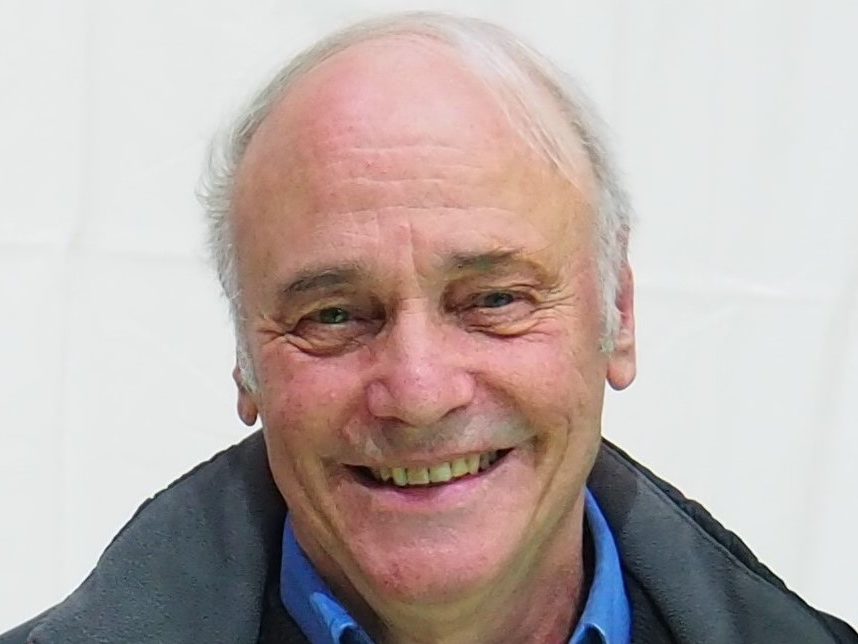Michel Favre celebrates his 80th birthday today. It is the opportunity to meet with one of the creators of our sport.
As Michel Favre got off the train for our meeting prior to his 80th birthday, we started talking about an article he had just read on quantum physics! There’s no doubt, today we’re going to meet a passionate and fascinating man who, for once, is not going to talk to us about tchoukball, but about himself!
A youth shaped by sport
Michel was born on 21 November 1943 in Val-de-Ruz, in the canton of Neuchâtel, Switzerland. He describes his childhood as marvellous, and when I ask him to describe young Michel, who didn’t yet know tchoukball, he smiles and sighs and says, “Young Michel was hyperactive, fortunately he had sports”. And he devoted many, many hours to sport – every available hour outside his studies. He was passionate about football and was selected to play for the Neuchâtel junior team. In winter, he enjoyed ice hockey. And countless hours of training and competition were invested in his third sport, shooting. In this sport, he practised all three positions, and his results earned him selection for the Swiss national team.
He studied at the engineering school in Le Locle, followed by a degree in mathematics and physics at the University of Neuchâtel. As a young graduate, he planned to go into research, but returned to the engineering school in Le Locle as a replacement. He was appointed professor of mathematics there at the age of just 24, and remained loyal to teaching throughout his professional career, until he retired at the age of 63.
His meeting with Dr. Hermann Brandt
In his spare time, he devoted himself to sports, working as a football instructor and sharing his passion for sport with the young people he coached. In March 1968 he met Dr Hermann Brandt, who shared with him his vision of a new sport. Immediately attracted by the values and educational potential of tchoukball, Michel supported Dr Hermann Brandt in developing the sport. And despite their great age difference, a bond of respect and friendship linked the two men. When the elder passed away in 1972, Michel knew he had a great responsibility – to continue to spread the values and activities of tchoukball. And that is what he has done, day after day, with conviction and without counting the hours invested, over the last 50 years. And he is still doing it today.
Although the subject of our meeting was Michel, we inevitably returned regularly to the subject of tchoukball. Looking back, Michel tells us that he is moved to see the development of our sport and the growing number of people around the world who support and defend its values. At the same time, he thinks of all the people who have accompanied him on this journey and who are no longer with us today: On the one hand, the members of his family who supported him in his mission, especially his uncle Charles Tschachtli. Secondly, the people who contributed to its development at international level, particularly John Andrews, President of the FIEP (International Federation of Physical Education). While there is a note of nostalgia in his words, Michel is resolutely focused on the present and happy to see that his sport of tchoukball continues to grow from strength to strength.
An active retiree always available to give time to others
Retired in 2007, he continues to lead a very active life. He has spent a lot of time digitising all his historical tchoukball documents. Every Monday, Wednesday, and Friday evening he is in the sports hall at the Collège de la Fontenelle in Cernier, Switzerland to follow his club’s training sessions. He also holds presentations and introductions to tchoukball, including teaching future tchoukball trainers. And every Saturday morning from 10am to midday, he gives maths lessons to pupils who are struggling in this subject. He’s still a keen teacher and just as passionate about maths and physics. So much so that when we met for this interview, he got off the train, Science magazine in hand, and spoke to me, eyes shining and passionately driven, about current topics in quantum physics.
The conviction that the values of tchoukball make all the difference
To conclude our discussion, I asked him what he would like to say to all the people involved in tchoukball today. He reflects, and in his eyes I see emotion and memories of years gone by. He tells me that Dr. Brandt, when they last met in 1972, said to him: “Michel, you’ll see, you’ll experience wonderful moments with tchoukball”. Michel in turn told me: “I’m happy to see all these young people who are committed to tchoukball, and I can’t thank them enough for the work they do. It’s important to continue sharing the values of our sport. Tchoukball is a sport in which teams play with and not against each other. He wants to continue to believe that our sport is a vehicle for peace between people, and even countries. And even though he knows it’s a utopian idea, he whispers to me with a mischievous smile: “Imagine if we could get Biden and Putin to play tchoukball. If only they could understand its values!”
Michel, today is your 80th birthday and on behalf of the entire tchoukball family around the world, I’d like to say THANK YOU. THANK YOU for everything you’ve done for our sport, for your commitment and for the kindness you show to everyone you meet. You are a role model for us all and we can learn from you every day.
Happy Birthday Michel!


 Français
Français